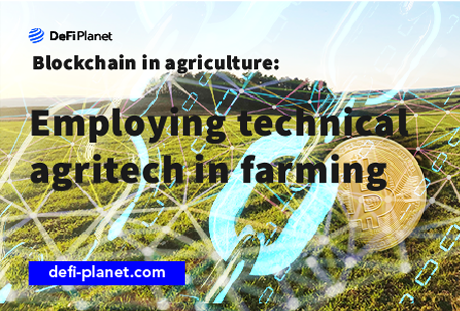Last updated on June 21st, 2023 at 04:52 pm
A blockchain is a ledger of immutable records that are distributed across thousands of computers connected to the network. These computers are often called nodes. Once data is recorded on the blockchain, all participating computers connected to the network will have access to it, which explains why it is also referred to as distributed ledger technology.
Before data is recorded on the blockchain, it is verified using different consensus algorithms like the proof-of-work, proof-of-stake, and so on. Once data is added, it cannot be changed, making them immutable and transparent.
The unique properties of blockchain such as efficiency, speed, transparency, and decentralization have paved the way for this technology to be adopted in many sectors of the economy including finance, healthcare, supply chain, and even agriculture. In essence, blockchain has the power to revolutionize agriculture.
With blockchain technology, transactions between individuals can be tracked from the origin, thus preventing cases of fraud and manipulation to a large extent. This attribute is important such that the origin of agricultural products can be tracked even in a complex supply chain system. This gives an insight into the quality and safety of agricultural products before consumption.
This article will highlight the necessity of blockchain in agriculture, as well as the potential use cases of this technology in this field.
Why Blockchain is Necessary for Agriculture
As stated earlier, blockchain is gaining popularity in diverse areas including agriculture. Some reasons why blockchain is necessary for agriculture include:
- Investigating food quality
- Transparency
- Promoting efficiency
- Faster business transactions
- Promoting fair prices
- Modernizing farm management software
Investigating food quality
The quality of agricultural produce can be investigated through the use of blockchain technology. Every single piece of data regarding the product such as seed type, the quantity of fertilizer and herbicide used, the proportion of nutrients contained in the fertilizer, the number of preservatives used, and more are recorded on the blockchain. Each of these data is used to assess the quality of a product and can also influence a potential customer’s decision.
Transparency
Blockchain provides transparency among all participating nodes in the network. When all data regarding agricultural produce is recorded on a blockchain, it becomes immutable and is distributed across all nodes in the network. The block records all steps in a product’s value chain. Because this data is immutable and cannot be changed, it promotes transparency and eliminates room for fraudulent practices.
Also in situations where the government provides subsidized agricultural materials for farmers, there may be hiccups. It is a known fact that farmers indirectly contribute to funds used for subsidies through tax payments. However, the rightful farmers may not access subsidized products or the products may be given to a larger group of farmers.
However, deploying blockchain to agriculture will increase transparency by showing which farmers pay more taxes, hence, channeling subsidized products to the right place.
Promoting efficiency
Blockchain technology enhances efficiency in any setting. All data right from the cultivation process to harvest, down to the final consumer can be tracked. Bookkeeping and farm inventory processes will also be more efficient with blockchain.
Faster business transactions
The use of blockchain technology plays an important role in facilitating agro-related international businesses. Currently, there is a growing interest in the use of cryptocurrencies, especially stablecoins, to facilitate international trade. Cryptocurrency requires the use of blockchain to verify transactions. Unlike traditional financial institutions where cross-border transactions may take days, cryptocurrency transactions can take between 5–10 minutes.
Promoting fair prices
Many farmers face the challenge of having their foods and livestock poorly priced. Even wholesale buyers don’t get to offer them fair prices, making them lose so much money.
With blockchain, farmers will be able to sell their products to buyers at fair prices. Because negotiation power rests with the farmers, losses will be minimal.
Modernizing farm management software
A typical farm management software uses the client-server operation model, making output minimal compared to what blockchain technology could offer. By combining the blockchain and farm management software, will optimize efficiency, improve security, and prevent cyber attacks.
Use Cases of Blockchain in Agriculture
Blockchain can be vastly used in agriculture in the following areas:
- Food supply chain
- Online sales of agricultural produce
- Smart agriculture
- Agricultural insurance
Food Supply Chain
The food supply chain has become more complex with technological advancement giving rise to concerns of food quality and safety, traceability, trust, and efficiency. These factors are considered risks, capable of causing health problems to humans.
However, the use of blockchain technology promotes trust between farmers and clients because all data pertaining to each produce is recorded on the blockchain. This can attach more value to a farmer’s produce, build up his reputation, increase competitiveness and promote transparency.
With the blockchain, products of low quality will be pushed out of the market, prompting farmers to improve the quality of their products. Thus, in turn, will boost consumers’ confidence about food production, and address their concerns of food quality and safety.
There are also suggestions that the use of blockchain will create an avenue for consumers and suppliers to interact more convincingly and remove obstacles between them.
The use of blockchain in the food supply chain reduces the burden for regulators because it ensures reliable and accurate data are available for them to conduct assessments.
Smart Agriculture
Smart agriculture is the use of information technology, the internet of things, artificial intelligence, machine learning, and other modern data collection and analysis technologies in agriculture. Blockchain in agriculture serves to store immutable data, from seeding to harvest and sale, which concerned parties could have access to.
Though smart agriculture may seem complex, some models have been proposed. For example, there is a model that merges blockchain and IoT. It proposes a smart greenhouse farm where the IoT sensors act as a private blockchain that is managed by the farmer centrally.
Online sales of Agricultural Products
A major challenge associated with the sale of agricultural products online is that product information cannot be readily confirmed. This is just the same way that payment methods and logistics are also major problems in developing nations.
The use of blockchain in the sales of agricultural products online will make all data concerning all farm produce immutable, hence creating trust. This will also improve security through encryption and authentication.
With blockchain, digital payment solutions will be further diversified through the integration of crypto payment gateways which will allow customers to pay for products using cryptocurrencies.
In a situation where farm products are produced by small families, traditional e-commerce platforms often decline them the opportunity to showcase their products due to low transaction volume. Blockchain technology will allow farmers with different production sizes to market and sell their produce.
Furthermore, the use of blockchain will enhance supply chain management, giving customers access to all necessary data concerning each product; thus promoting trust and transparency.
Agricultural Insurance
Agricultural insurance is a scheme aimed at managing risks in the case of eventualities such as fire, natural disasters, or extreme weather conditions. Usually, farmers get to pay an insurance premium before planting season begins. If he loses the farm, he receives a payroll to minimize financial exposure, leaving the insurance firm (insurer) to bear all the insured risks.
When it comes to agricultural insurance, there are varying factors. In the case of indemnity-based insurance, farmers are indemnified based on an assessment of the damage that was triggered by an expert on the farm.
Employing blockchain in agriculture will do the following:
- Enhance timely payment and automation of weather data that facilitates payment as stipulated by the smart contract.
- Weather, plant growth, machinery data, and others can be automatically integrated, improving trust between the farmer and insurer, and making the payout process more efficient.
Challenges associated with infusing blockchain into agriculture
We have seen the vast application of blockchain in agriculture; how it enhances automation, trust, and transparency. However, there are challenges associated with the use of this technology in the agricultural sector:
Data originality
More work needs to be done regarding the data farmers supply the blockchain. This will help to know if it is the precise information regarding the plant or animal produce that is supplied to the blockchain. For example, a farmer might collect field data in an erroneous and complex manner, making it difficult to differentiate the data. This affects the final results. Providing standard operating procedures (SOPs) for data collection will help solve this challenge.
Data collection cost
The cost of obtaining data to upload to a blockchain may be expensive, hence posing a barrier to the adoption of blockchain in agriculture. It is important to note that setting up the technology may be quite cheap, however, collecting data to incorporate into the ledger is usually expensive.
In Conclusion…
- The decentralized nature of blockchain technology has enhanced its vast application in agriculture, promoting food quality and safety, trust and transparency. A combination of blockchain and the internet of things enhances smart agriculture.
- Even as this technology is still being explored, it is expected that more blockchain solutions will find more applications in agriculture. With the global agriculture industry now standing at $2.4 trillion with millions of people participating globally, integrating blockchain is expected to pave room for more growth and innovation.





















